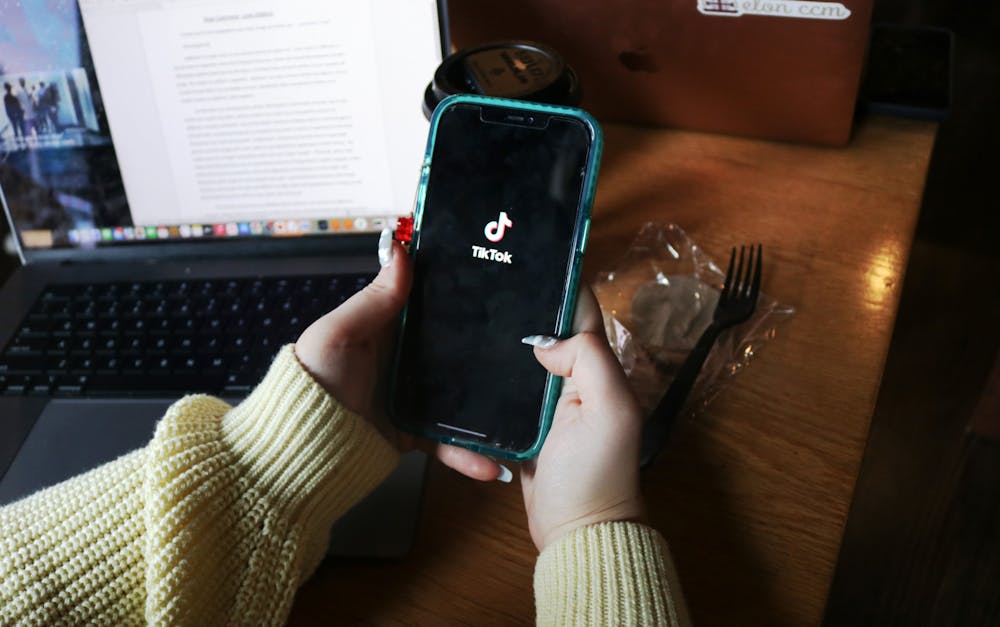The popular video creating and sharing platform TikTok was banned from both the University of Texas at Austin and Auburn University in December. According to an article from Bloomberg, security risks such as cyberspying and collecting personal information from devices caused college administration to ban the mobile app on campus wifi.
The University of Texas at Austin banned TikTok to protect student’s personal information from potentially being taken by the Chinese Communist Party, according to an article from Campus Reform. Auburn University is concerned that students may be surveilled by the Chinese government and pose a national security risk.
In an article from The Washington Post, Auburn University students realize how much the ban affects them. Students didn’t see how much this change hurt the campus until professors struggled with lessons on the application, such as reviewing books, and media lectures.
There has been no talk of Elon University banning TikTok from campus wifi, and university spokesperson Owen Covington said he does not think this change will surface on campus in the future.
“With TikTok, as with any app, users should actively educate themselves about potential privacy and digital security risks and take appropriate steps to protect themselves and their information,” Covington wrote in an email to Elon News Network.
Covington said he believes that anti-malware and privacy organizations are among those databases that will keep the campus wifi secure. Elon’s campus uses a multi-factor authentication, DUO Mobile, that prevents unauthorized data access from email as well as student’s personal work. To prevent harmful websites from hacking information on campus, Elon secures the wifi with Cisco Umbrella to avert data loss and malicious information.
Research from the Washington Post shows that TikTok steals information from over one billion users, such as which brand and device is being used, the IP address of the user, what content is being viewed and what app was used before TikTok.
The Children’s Online Privacy Protection Act protects minors under the age of 13 from being victims of stolen information. To stop data from being corrupted on devices, users can go into their settings and disable the data feature in the privacy column.
Freshman Katie Lysaght said she hopes that TikTok will not be banned on Elon’s campus.
“TikTok is a platform where we’re able to see news and things that are happening outside of our campus,” Lysaght said. “I don’t think it’s right for our college to restrict our access to the internet like that. I’d be very annoyed.”
Sophomore Ben Ohlmeyer also said he thinks students would be annoyed, even though he is not an avid user of the app.
“I do use it once in a while to scroll through and find entertainment,” Ohlmeyer said. “I feel like it definitely has its place to be used and overused, but obviously I feel that it’s anybody's right to be able to choose what’s on their phone.”
As schools such as University of Texas at Austin and Auburn University ban TikTok on campus wifi and devices, Elon University currently has no plans to ban the app, according to university spokesperson Owen Covington.
Last December, Auburn University banned TikTok to protect student’s personal information from potentially being taken by the Chinese Communist Party, according to an article from Campus Reform. Auburn University and The University of Texas at Austin are two of several universities concerned that students may be surveilled by the Chinese government and pose a national security risk.
Research from the Washington Post shows TikTok takes information from over 1 billion users, such as which brand and device is being used, the IP address of the user, what content is being viewed and what app was used before TikTok.
Covington said that while the university has no current plans to ban the app on school wifi, students should take precautions protecting their information.
“With TikTok, as with any app, users should actively educate themselves about potential privacy and digital security risks and take appropriate steps to protect themselves and their information,” Covington wrote in an email to Elon News Network.
Covington said he believes that anti-malware and privacy organizations are among those databases that will keep the campus wifi secure. Elon’s campus uses a multi-factor authentication, DUO Mobile, that prevents unauthorized data access from email as well as student’s personal work. To prevent harmful websites from hacking information on campus, Elon secures the wifi with Cisco Umbrella to avert data loss and malicious information.
Freshman Katie Lysaght said she hopes TikTok will not be banned on Elon’s campus.
“TikTok is a platform where we’re able to see news and things that are happening outside of our campus,” Lysaght said. “I don’t think it’s right for our college to restrict our access to the internet like that. I’d be very annoyed.”
Sophomore Ben Ohlmeyer also said he thinks students would be annoyed, even though he is not an avid user of the app.
“I do use it once in a while to scroll through and find entertainment,” Ohlmeyer said. “I feel like it definitely has its place to be used and overused, but obviously I feel that it’s anybody's right to be able to choose what’s on their phone.”


